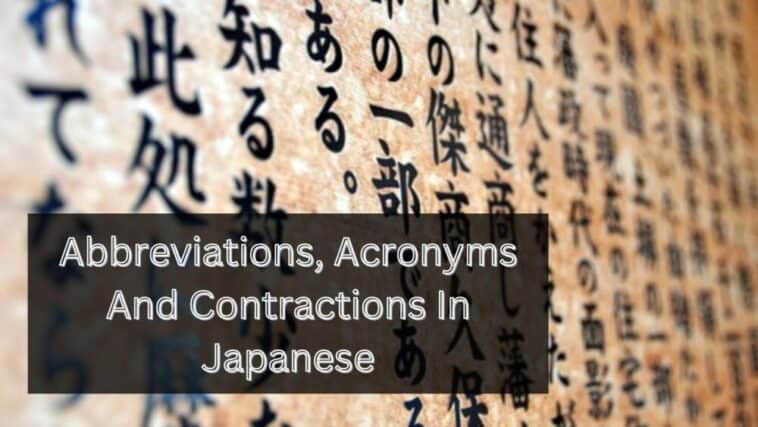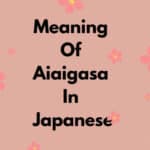Wondering what Japanese terms are abbreviations, acronyms and contractions? This article will teach you everything you need to know about them!
Lost in a sea of OLs and KYs? Don’t sweat it! We unveil the hidden meanings behind essential Japanese abbreviations and contractions, from texting slang to everyday terms. Master these shortcuts and navigate the language with confidence!
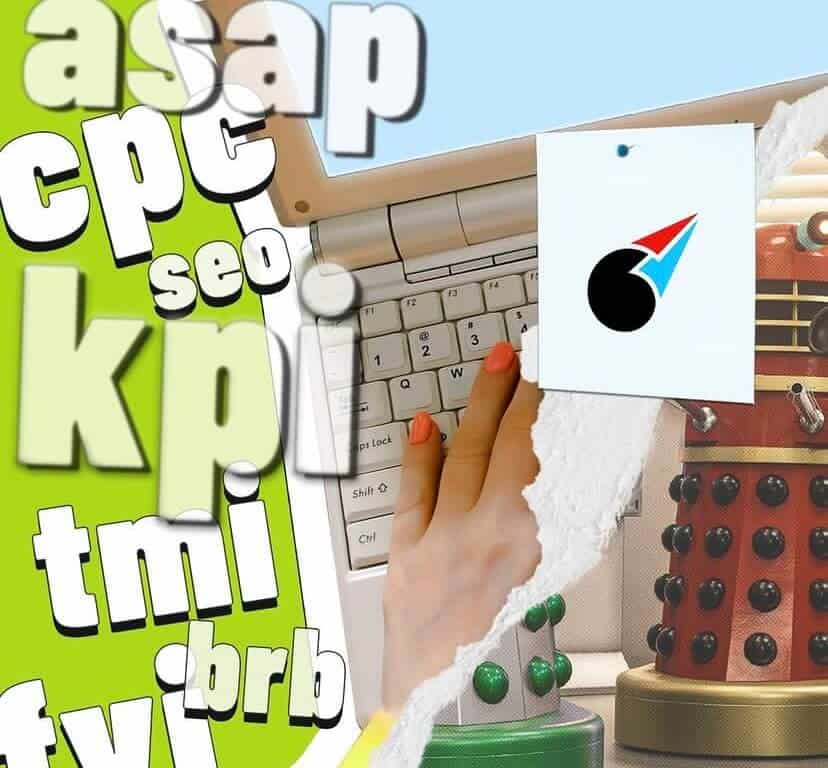
Abbreviations, Acronyms And Contractions In Japanese
Technically speaking, abbreviations and contractions are different and although it can be easy to mix them up, they are quite different. An abbreviation in Japanese which is also known as りゃく is when a phrase or word is made shorter which is usually done to make it quicker and easier to say or write.
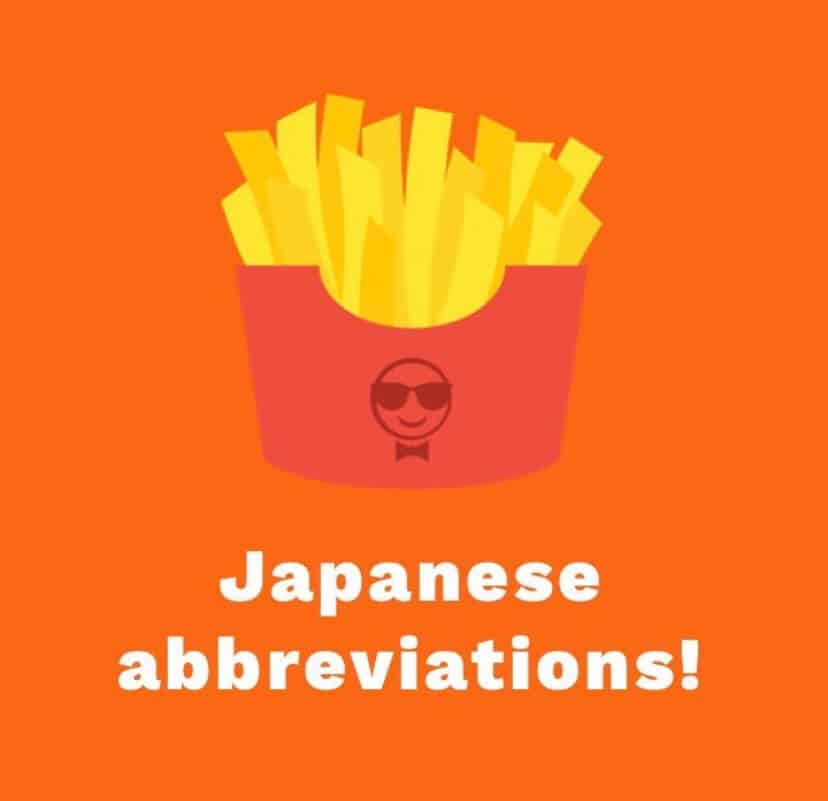
- Related: Ways To Say Goodbye In Japanese
- Related: Ways To Say Thanks In Japanese
Two examples would be with the phrase:

Happy New Year it gets reduced from あけましておめでとうございます to simply あけおめ.
Cellphone or keitai denwa gets reduced from 携帯電話 to 携帯.
Since the last word is really more of grammatical construction, it tends to get left out entirely and as you can see from the above, the abbreviations are much easier to use.
Another common example would be Immigration Bureau which gets reduced from にゅうこくかんりきょく to just にゅうかん in most daily conversations.
Here is a list of some of the most common Japanese abbreviated words that can be heard everywhere:
1. Department store, デパートメントストア gets reduced to Depaato, デパート
2. Apartment, アパートメント gets reduced to Apaato, アパート
3. Convenience store, コンビニエンスストア gets reduced to Konbini, コンビニ
4. Supermarket, スーパーマーケット gets reduced to Suupaa, スーパー
5.McDonald’s, マックドナルド gets reduced to Makku/Makudo, マック/マクド
6. Starbucks, スターバックス gets reduced to Sutaba, スタバ
7. Good morning, おはようございます gets reduced to Ossu, おっす
8. Well done/good job, おつかれ gets reduced to Otsu, おつ
9. Thank you, ありがとうございます gets reduced to Aza/Azassu, あざ/あざっす
10. Television, テレビーション gets reduced to Terebi, テレビ
11.Smartphone, スマートフォ(ホ)ン gets reduced to Sumaho, スマホ
12. Instagram, インスタグラム gets reduced to Insuta, インスタ
13. Appointment, アポイントメント gets reduced to Apo, アポ
14. Pocket monsters, ポケットモンスター gets reduced to Pokemon ポケモン
15. Sandwich, サンドイッチ gets reduced to Sando, サンド
16. Potato chips, ポテトチップス gets reduced to Potechi, ポテチ
17. Salad dressing, サラダドレッシング gets reduced to Saradore, サラドレ
18. Ah, I see, ああ、なるほどね gets reduced to Ane, あね
19. Party people, パーティーピープル gets reduced to Paripi, パリピ
20. Presentation, プレゼンテーション gets reduced to Purezen, プレゼン
Acronyms In Japanese
As you may already know, an acronym is a word formed from the initial letters of a name. It is a form of abbreviation but there is some difference between the two.
The Japanese also use roman letters and many of the acronyms of places and things have their acronym in Roman letters. They are used somewhat commonly, here is a complete list of common Japanese acronyms and what they stand for:
1. PV stands for Promotional Video ピーヴィー
2. JR stands for Japanese Railway ジェイアール
3. OL stands for Office Lady オルエル
4. CM stands for Commercial シーエム
5. OP stands for Opening オーピー
6. NG stands for No Good エヌジー
7. AV stands for Audio-visual 視聴覚
8. JASSO stands for Japan Student Services Organization 日本学生支援機構
9. JASDF stands for Japan Air Self-Defense Force 航空自衛隊
10. JMA stands for Japan Medical Association 日本医師会
11. JP or JPN stands for Japan 日本
12. MIC stands for Ministry of Internal Affairs and Communications 総務省
13. NNN stands for Nippon News Network ニッポンニュースネットワーク
14. OVA stands for Original video animation オリジナルビデオアニメーション
15. JRC stands for Japan Cross 日本赤十字社
16. AIST stands for National Institute of Advanced Industrial Science and Technology 産業技術総合研究所
17. BGM stands for Background Music バックグラウンドミュージック
18. DPJ stands for Democratic Party of Japan 民主党
19. JBIC stands for Japan Bank for International Cooperation 株式会社国際協力銀行
20. JNTO stands for Japan National Tourist Organization 日本政府観光局
Contractions In Japanese
In simple terms, a contraction is a process of shortening a word by an elision (the omission of a sound or syllable when speaking) or a combination.
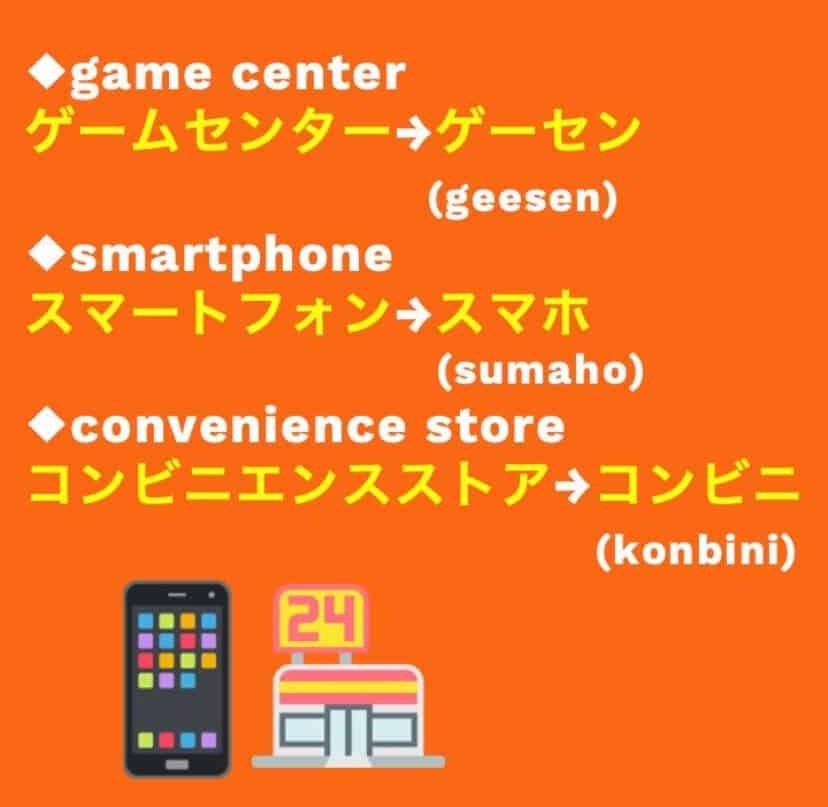
So, just remember that these contractions are like the normal version of the words except that there is an omission of a sound which is mostly to do with speaking and not writing. A common example is :
I am Tanaka たなかです。becomes I’m Takana たなかっす。
These contractions are very common with grammar patterns and are modified to make more fluid spoken conversations. Another example is: What are you doing? (なにをしている?)becomes What’cha doin? (なにしてる?). You will find this when people are talking casually to one another. Here is a list of more examples below:
- After-school club (extracurricular) activity or bukatsudō 部活動 gets reduced to bukatsu 部活.
2. Mobile phone or keitaidenwa 携帯電話 gets reduced to keitai 携帯.
3.Japan Economic Times or Nihon Keizai Shinbun 日本経済新聞 gets reduced to nikkei 日経.
4. Agricultural University of Tokyo or Tōkyō Nōgyō Daigaku 東京農業大学 gets reduced to nōdai 農大.
5.Music University or ongaku daigaku 音楽大学 gets reduced to wave 音大.
6. Tokyo Metropolitan Government Building or Tōkyō-to Chōsha 東京都庁舎 gets reduced to Tochō 都庁.
7. Air conditioning or Ea kondishonā エアコンディショナー gets reduced to eakon エアコン.
8.Digital cameras or dejitaru kamera デジタルカメラ gets reduced to dejikame デジカメ.
9. Family restaurant or famirī resutoran ファミリーレストラン gets reduced to famiresu ファミレス.
10. Email address or meeruadoresu メールアドレス gets reduced to mid メアド.
11. Game centre ゲームセンター gets reduced to Gemusen, ゲムセン
12. Seven-Eleven, セブンイレブン gets reduced to Sebun, セブン
13. Family Mart, ファミリーマート gets reduced to Famima, ファミマ
14. Operations centre, オペレーションセンター gets reduced to Opesen, オペせん
15. Family Mart fried chicken, ファミリーマートフライドチキン gets reduced to Famichiki, ファミチキ
16. Seven-Eleven fried chicken, セブンイレブンチキン gets reduced to Nanachiki, ナナチキ
17. Good luck or thank you for the coming year, ことしもよろしくお願いします gets reduced to Kotoyoro, ことよろ
18. Personal computer i.e. laptops, パーソナルコンピューター gets reduced to Pasokon, パソコン
19. Chocolate, チョコレート gets reduced to Choko, チョコ
20. I’m leaving to take a bath, おふろに入るので、りだつする gets reduced to Furorida, フロリダ
Why Does It Matter?
Abbreviations are selectively used in many spoken conversations in Japan. Many common abbreviations such as titles and measurements are still used in written form.
We even find ourselves chatting and texting with our friends and family using such abbreviations, acronyms and contractions.
Mostly, you use it only in informal conversations and a good rule of thumb is to use abbreviations and acronyms with only people you are familiar with like when you have a conversation with a colleague, it would be appropriate to use only such abbreviations and acronyms particular to your line of work.
At the end of the day, their job is just to make our life easier to read and understand complex words and lengthy phrases. It not only saves time and effort but also makes reading easier and provides a quick, easy, and convenient way of indicating something.
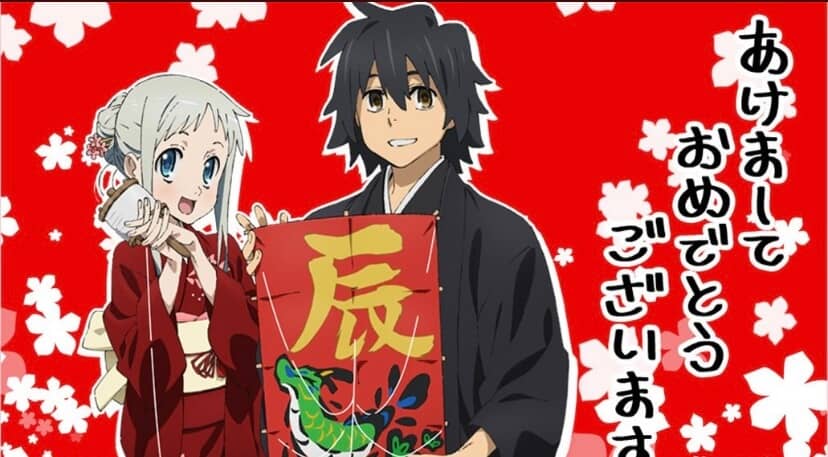
Why do the Japanese use shorter words?
The Japanese language is very fond of making both abbreviations and contractions of commonly used words simply because it makes speaking a lot easier.
Think about it. It’s exactly in English where we typically use contractions instead of their full versions like you’re instead of “you are,” can’t instead of “cannot” and I’ll instead of “I will.”
Where will you find these shorter words?
The first thing to keep in mind is that these abbreviations and contractions usually occur in natural speech, a casual conversation with friends and family.
Infact, they happen so much in Japan that people forget and may not even be aware of the original word.
Although it may be hard for non-native Japanese speakers to understand some of the contracted and abbreviated words and know what they stand for, it should not be a problem.
Conclusion
So, there you have it. You can use these Japanese abbreviations, acronyms and contractions in both speaking and informal writing. In business, they can be used to make writing emails and instant messages shorter and more concise.
Learning a new language is always challenging so with the right tools, it will be an exciting and fun journey for you. Do take the time to find the best way to learn the language quickly and easily.
You can get a lot of education through online courses, conversations and tutors. Which one of the above Japanese abbreviated words or contracted words do you like the most?
If you have any suggestions of Japanese abbreviations, acronyms or contractions, make sure to leave them in the comment section down below.
Stay tuned for more information about Japan culture, travel, living and more!
Also Read:


